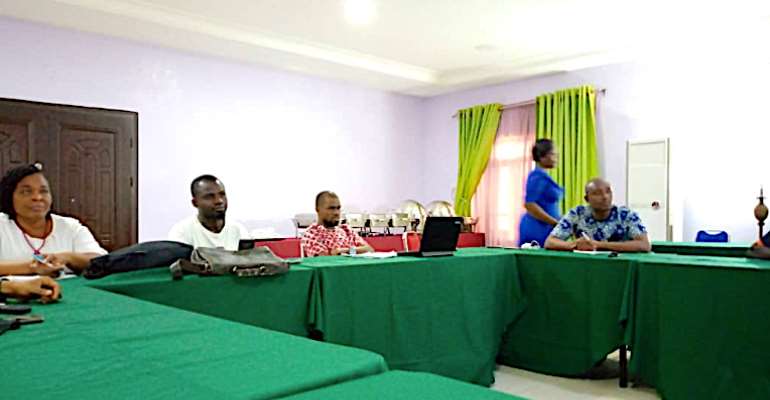Plea Bargain: RoLAC Organises Workshop for Anambra Journalists
Calls for Awareness Creation, Balanced Reportage

Media practitioners have been urged to take active in creating awareness about the concept of plea bargain and monitoring its application in the administration of criminal justice in Nigeria.
Dr. Akeem Olajide Bello of the Faculty of Law, University of Lagos, made the call during a one-day training organized for media practitioners in Anambra State.
Tagged 'Training of Judicial Correspondents on Plea Bargain and Sentencing Practices', the training, which held in Awka, the state capital, was organised by the Rule of Law and Anti-Corruption Programme (RoLAC), funded by the European Union and implemented by the British Council.
Speaking via video conferencing, the facilitator, Dr. Bello who is also a RoLAC Consultant described plea bargain as a negotiated agreement between a prosecutor and a defendant, whereby the defendant pleads guilty to a lesser offence or to one of multiple charges in exchange for some concession by the prosecutor, usually, a more lenient sentence, or a dismissal of the other charges.
According to him, plea bargain is not illegal but is provided for in the constitution, and is aimed at addressing some of the problems facing the administration of criminal justice in the country, such as problem of delay, high cost of prosecution, prison congestion, problem of inefficiency among others.
He said, "Nigeria as the biggest country in Africa has no single functional federal forensic laboratory to use for criminal cases, except the one recently established by the Lagos State Government, which does not even run the full complement of all the forensic tests analyses that are available. And I'm aware they usually travel abroad to do some of the forensic testings that would have been done in the country, which is very expensive.
"So in the light of all these challenges facing the administration of Criminal Justice in the country, if the defendant agrees to plea guilty to an offense, then he will be given a lesser sentence.
"Plea bargain does not mean that the offender is not going to be punished anymore; no, he is still going to be punished, but will be given a lesser punishment. With this therefore, all the delay, high cost, and inefficiencies associated with the prolonged trial and prosecution will be avoided; and prisons will equally be decongested."
Dr. Bello further cleared the doubt as to whether the application of plea bargain in the administration of the criminal justice has the tendency of increasing crime rates in the society, or awarding incommensurate sentences to serious crime offenders, or even get misused by the Attorney Generals of the states or that of the federation, who alone possess the exclusive power to initiate plea bargaining, according to the Nigerian Constitution. He hence urged journalists to join voice in advocating the concept and evaluating its application in the Administration of Criminal Justice Law (ACJL).
Contributing, the Anambra State Coordinator of RoLAC, Mrs Josephine Onah said media practitioners should start by conscientizing and pre-informing the public of existence of plea bargain and its operation which is gradually taking to stage in the country.
This, she said, should be done vis-a-vis with the fact that RoLAC has supported the review of the ACJL 2010, and that there's going to be an ACJL 2019.
"By so doing, the media lend their voices, to ask the state to please expedite actions and facilitate the legislative processes, so that we can get this law on board, which is an enabling framework for plea bargain manual and sentencing practices," she added.
The workshop had been done in Lagos and Edo states, with Anambra being the next privileged state to have witnessed it.
